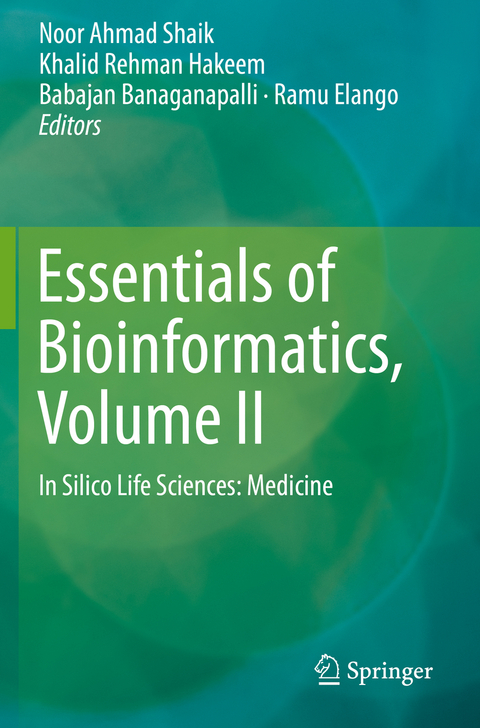
Essentials of Bioinformatics, Volume II
Springer International Publishing (Verlag)
978-3-030-18377-6 (ISBN)
Our second title of this volume set In Silico Life Sciences: Medicine provides hands-on experience in analyzing high throughput molecular data for the diagnosis, prognosis, and treatment of monogenic or polygenic human diseases. The key concepts in this volume include risk factor assessment, genetic tests and result interpretation, personalized medicine, and drug discovery. This volume is expected to train readers in both single and multi-dimensional biological analysis using open data sets, and provides a unique learning experience through clinical scenarios and case studies.
Noor Ahmad Shaik is an academician, researcher and technologist working in the field Human Molecular Genetics. Over the last 15 years he has been working with different research groups whose fundamental focus is to offer genetic disease diagnostics, management and therapy. He is interested in discovering the novel causal genes/biomarkers for rare hereditary disorders and also to understand the effect of mutations on structure and function of causal proteins of human diseases. He has already published 42 research publications in reputed international journals of human genetics and bioinformatics. He is currently working to improve the current mutation prediction methods through integrative computational algorithms, so that clinicians and scientists can better understand the functional relevance of genetic mutations to disease. He has been a recipient of several research grants from national and international funding agencies. He is currently rendering his editorial services to world renowned journals like Frontiers in Pediatrics and Frontiers in Genetic Disorders.
Dr. Khalid Rehman Hakeem (PhD) is Associate Professor at King Abdulaziz University, Jeddah, Saudi Arabia. He has completed his Ph.D. (Botany) from Jamia Hamdard, New Delhi, India in 2011. Dr. Hakeem has worked as Post Doctorate Fellow in 2012 and Fellow Researcher (Associate Prof.) from 2013-2016 at Universiti Putra Malaysia, Selangor, Malaysia. His specialty is Plant Eco-Physiology, Biotechnology & Molecular biology, Plant-Microbe-soil interactions and Environmental Sciences and so far has edited and authored more than 25 books with Springer International, Academic Press (Elsevier), CRC Press etc. He has also to his credit more than 120 research publications in peer reviewed international journals, including 42 book chapters in edited volumes with international publishers.
Dr. Babajan Banaganapalli (PhD) works as bioinformatics research faculty at King Abdulaziz University. He initiated and successfully running the interdisciplinary Bioinformatics program from 2014 to till-to date in King Abdulaziz University. He has more than 12 years of research experience in bioinformatics. His research interest spread across as genomics, proteomics and drug discovery for complex diseases. He published more than 40 journal articles, conferences papers and book chapters. He has also served in numerous conference program committees, organized several bioinformatics workshops, trainings programs and act as editor and reviewer for various international genetics/bioinformatics journals. Recently he was honored as young scientist for his outstanding research in bioinformatics by Venus International Research Foundation, India.
Dr. Ramu Elango (PhD) is a well experienced molecular geneticist and computational biologist with extensive experience at MIT, Cambridge, USA and GlaxoSmithKline R&D, UK, after completing his Ph.D. in Human Genetics at All India Institute of Medical Sciences, New Delhi, India. At GlaxoSmithKline, he contributed extensively in many disease areas of interest in identifying novel causal genes and tractable drug targets. Dr Ramu Elango presently heads the Research & Laboratories at the Princess Al-Jawhara Center of Excellence in Research of Hereditary Disorders, King Abdulaziz University. His research focus is on genetics and genomics of complex and polygenic diseases. His team exploits freely available large scale genetic and genomic data with bioinformatics tools to identify the risk factors or candidate causal genes for many complex diseases.
1. Driving forces of Bioinformatics.- 2. Genetic association from RFLPs to millions of variant markers - Unravelling the genetic complexity of diseases.- 3. Diagnostic revolution post-Human Genome Sequence project: High throughput technologies and Bioinformatics.- 4. Genomic revolution driven Cancer Research.- 5. Chromosomal Microarray in the New High Throughput Technological and Bioinformatic Era.- 6. Finding a Needle in a Haystack: Variant Effect Predictor (VEP) to Prioritize Candidate Variants from Millions.- 7. Clinical Strategies for Developing Next-Generation Cancer Precision Medicine.- 8. Dental stem cells in regenerative medicine: Emerging trends and prospects in the era of bioinformatics.- 9. Multiple Analyte Profiling Technology (xMAP) coupled with Functional Bioinformatics Strategies: Potential Applications in Protein Biomarker Profiling in Autoimmune Inflammatory Diseases.- 10. Design and Development of Small Molecules from Somatic, Stem Cell Reprogramming and Therapy.- 11.Molecular Modeling and drug design techniques in Microbial Drug Discovery.- 12.- Combinatorial designing of novel lead molecules towards the putative drugs targets of extreme drug resistant Mycobacterium tuberculosis: a future insight for molecular medicine.- Index.
| Erscheinungsdatum | 31.10.2020 |
|---|---|
| Zusatzinfo | XV, 309 p. 75 illus., 72 illus. in color. |
| Verlagsort | Cham |
| Sprache | englisch |
| Maße | 155 x 235 mm |
| Gewicht | 504 g |
| Themenwelt | Informatik ► Weitere Themen ► Bioinformatik |
| Naturwissenschaften ► Biologie ► Genetik / Molekularbiologie | |
| Schlagworte | Bioinformatics • Disease Therapeutics • gene therapy • Genetic Risk Marker Studies • Molecular Diagnosis • Risk factor assessment |
| ISBN-10 | 3-030-18377-7 / 3030183777 |
| ISBN-13 | 978-3-030-18377-6 / 9783030183776 |
| Zustand | Neuware |
| Informationen gemäß Produktsicherheitsverordnung (GPSR) | |
| Haben Sie eine Frage zum Produkt? |
aus dem Bereich


